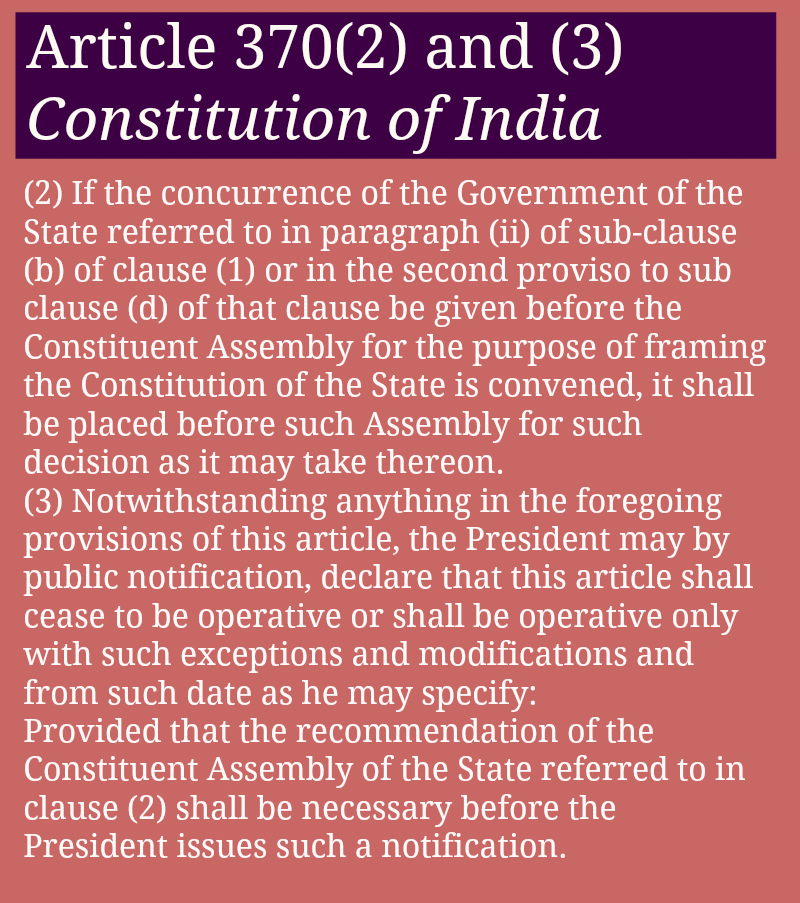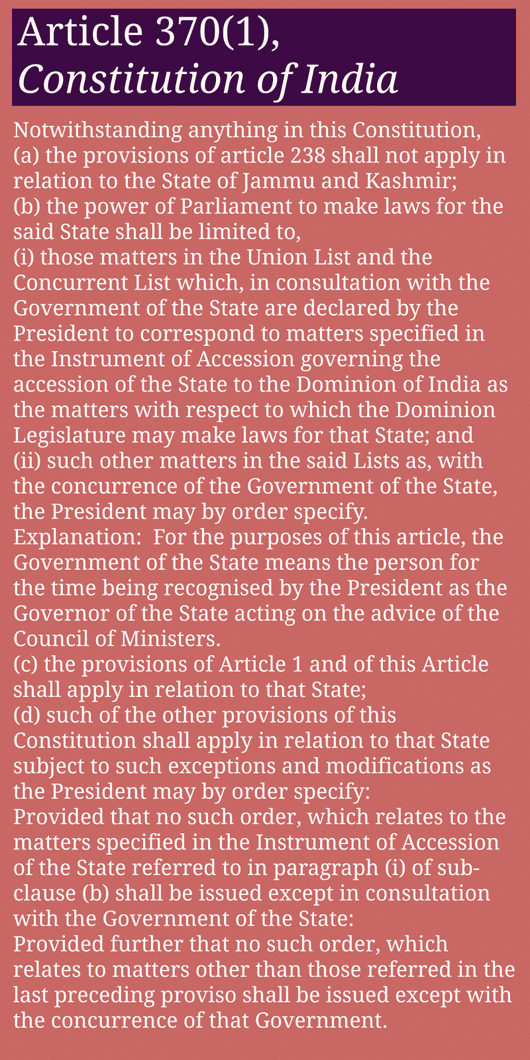 Prime Minister Narendra Modi revived the debate over Article 370 of the Constitution of India during his election campaign. A brief tour of the factors that influenced the drafting of that constitutional provision and the interpretation of its text will provide better context to the debate that has followed Mr. Modi’s remarks. These factors include some of the events that transpired between the departure of the British from the subcontinent in August 1947 and the adoption of the Constitution of Jammu and Kashmir in January 1957.
Prime Minister Narendra Modi revived the debate over Article 370 of the Constitution of India during his election campaign. A brief tour of the factors that influenced the drafting of that constitutional provision and the interpretation of its text will provide better context to the debate that has followed Mr. Modi’s remarks. These factors include some of the events that transpired between the departure of the British from the subcontinent in August 1947 and the adoption of the Constitution of Jammu and Kashmir in January 1957.
The events that should inform any discussion about Article 370
Out of the 562 princely states in India, Kashmir was among those that the British did not rule directly. The British government transferred the state forever to Maharaja Gulab Singh under the Treaty of Amritsar, 1846, and fixed a nominal annual payment to protect his territories from external enemies. A key development in the history of Jammu and Kashmir in the twentieth century is the crystallisation of the popular opposition to the Maharaja’s rule through the Jammu and Kashmir National Conference, led by Sheikh Abdullah. With India’s independence, Maharaja Hari Singh, the ruler of Kashmir in 1947, had three options: to remain independent, merge with India, or merge with Pakistan. Pressing the Maharaja, who initially wanted to remain independent, to accede to India, Prime Minister Jawaharlal Nehru, in one of his letters said,
“It is of the most vital importance that Kashmir should remain in the Indian Union. But however much we may want this, it cannot be done ultimately except through the goodwill of the mass of the population. Even if military forces held Kashmir for a while, a later consequence might be a strong reaction against this. Essentially, therefore, this is a problem of psychological approach to the mass of the people and of making them feel being in the Indian Union will benefit them. If the average Muslim feels that he has no safe or secure place in the Union, then obviously he will look elsewhere. Our basic policy must keep this in view, or else, we fail.”

When Hari Singh declared Jammu and Kashmir independent in 1947, Pakistan immediately launched a guerrilla war to free the region, which had a majority of Muslims, from Hindu rule. The Maharaja, realising his inability to protect his territory, requested the Indian government for help. The Indian government insisted that Kashmir accede to India before it would send its army. The Maharaja agreed to the same and the Indian government and the Maharaja signed the accession treaty (“the Instrument”) on October 26, 1947.
Importantly, Clause 5 of the Instrument said that it could not be altered without the state’s consent. Clause 7 specifically protected the state’s right to ratify the application of any future constitution of India in its territory. It read:
“Nothing in this Instrument shall be deemed to commit me in any way to acceptance of any future Constitution of India or fetter my discretion to enter into arrangements with the Government of India under any such future Constitution.”
The Instrument did not result in the merger of Kashmir – governed by its own Constitution of 1939 – into India and only created a temporary settlement under which India’s government would look after the subjects of defence, foreign affairs, and communication while Kashmir would have its own constitution, flag, and Prime Minister. In a broadcast on November 2, 1947, Nehru spoke of the temporary nature of the Instrument.
“…Both the Kashmir government and the National Conference pressed us to accept this accession and to send troops by air, but made condition that the accession would have to be considered by the people of Kashmir later when the peace and order were established…”
 Some of the other important events that influenced the drafting of Article 370 were the political turmoil in Jammu and Kashmir, the United Nations resolutions calling for a plebiscite in the state on the issue of accession to India, the governments of both India and Pakistan establishing political control over the territories of Kashmir under their control, and the representatives of all the other states choosing, in India’s Constituent Assembly, to not assert their right to separate constitutions.
Some of the other important events that influenced the drafting of Article 370 were the political turmoil in Jammu and Kashmir, the United Nations resolutions calling for a plebiscite in the state on the issue of accession to India, the governments of both India and Pakistan establishing political control over the territories of Kashmir under their control, and the representatives of all the other states choosing, in India’s Constituent Assembly, to not assert their right to separate constitutions.
Jammu and Kashmir, unlike the other princely states, was not willing to accept the Constitution of India and was adamant on acting only on the basis of the terms of Instrument, specifically Clause 7. Gopalaswami Ayyangar, a Minister without portfolio in Nehru’s government, moved the Bill for Article 370 in India’s Constituent Assembly. He made the following argument.
“Till India became a Republic, the relationship of all the States with the Government of India was based on the Instrument of Accession. In the case of other Indian States, the Instruments of Accession will be a thing of the past in the new Constitution; the States have been integrated with the Federal Republic in such a manner that they do not have to accede or execute a document of accession for becoming units of the Republic. It would not be so in the case of Kashmir since that particular State is not yet ripe for this kind of integration due to special conditions prevailing in Kashmir. In the first place there has been a war going on within the limits of Jammu and Kashmir State — part of the State is still in the hands of the enemies, and in the second place, the Government of India have committed themselves to the people of Kashmir in certain respects. They have committed themselves to the position that an opportunity will be given to the people of the State to decide for themselves the nature of their Constitution.”
Sardar Patel, the then Minister of States in India, declared in the Constituent Assembly,
“In view of the special problem with which the Jammu and Kashmir Government is faced, we have made special provisions for the continuance of the State with the Union on the existing basis.”
Soon after India adopted its constitution, the National Conference’s leader Sheikh Abdullah — the interim Prime Minister of the state and the most popular leader of the state’s Muslims —called for independence from India. The government of India dismissed his government and placed him in preventive detention. Seven years after the Constitution of India was adopted, the Constitution of Jammu and Kashmir came into full force. Among its 158 sections is Section 3, which clearly states that, “The State of Jammu and Kashmir is and shall be an integral part of the Union of India” and is not amenable to change even using the amending provisions of that constitution.
Apart from these events, we can also learn much from the text of Article 370, including the use of the word “temporary” in its title.
Lessons from the text of Article 370
Mr. Ayyangar had said in the Constituent Assembly that Article 370 is labeled a ‘temporary’ provision in order to keep the door open for the day when the state of Jammu and Kashmir would merge with India and fully accept the Constitution of India.
Sub-clause (a) of Clause (1) states that Article 238, which regulated the relationship between the Union and the princely states before the Seventh Amendment repealed it in 1956, shall not apply in relation to Jammu and Kashmir. Sub-clause (b) provides that the Parliament can make laws for the state of Jammu and Kashmir on matters in the Union and the Concurrent Lists (in Schedule Seven of the Constitution of India) only if the President (after consultation with the government of the state) declares that such a subject fits the description of the matters of defence, communication, finance, and external affairs. Sub-clauses (c) and (d) make it clear that at the time the Constitution came into effect, only Article 1 – which defines the components of the Union of India – and Article 370 itself, applied to the state. Other constitutional provisions can only be made applicable to the state with the agreement of the state government.
Therefore, even though Jammu and Kashmir is a constituent state of the Union of India under Schedule 1 of the Constitution of India, it is exempt from many provisions of the Constitution and is even allowed to have a separate constitution. With Union laws – other than those governing the subjects of defence, external affairs, finance, and communications – not applicable to the state without the permission of the government of Jammu and Kashmir, the state’s residents live under a separate set of laws, including those related to citizenship, ownership of property, and fundamental rights. The provisions of Article 370 and the other exceptions in the Constitution regarding the state have created a unique relationship between the Union government and the state. As MP Jain points out, “the two characteristic features of this special relationship are, (1) the State has much greater measure of autonomy and power than enjoyed by the other States and (2) Centre’s jurisdiction within the State is more limited than what it has with respect to other States.”
Today, a number of provisions of the Constitution of India stand extended to the state of Jammu and Kashmir. Important amongst these are Article 356, which deals with the imposition of President’s rule in a state and the jurisdictions of the Supreme Court, the Election Commission, and the Comptroller and Auditor General. There is however, a vast area that still remains under the exclusive jurisdiction of the state government. The Indian Penal Code, 1860, the Prevention of Corruption Act, 1988, the Religious Institutions (Prevention of Misuse) Act, 1988, and the Delhi Special Police Establishment Act, 1946 are some crucial Union laws that are not at all applicable to the state. The Protection of Human Rights Act, 1993, the Commissions of Inquiry Act, 1952, the Unlawful Activities (Prevention) Act, 1967, and the Representation of the People Act, 1951 are only partly applicable.
Can Article 370 be amended under the provisions of the Constitution?
 The answer is no. Article 368, which contains the provisions governing the amendment of the Constitution, applies to all the other states of India except Kashmir. In relation to Kashmir, a proviso has been added to Article 368 by the Constitution (Application to Jammu and Kashmir) Order, 1954, which says that no constitutional amendment “shall have effect in relation to the State of Jammu and Kashmir” unless applied by an order of the President of India, under Article 370. Clause 3 of Article 370 states that the President can issue a notification to cease the operation of Article 370 or to restrict it operation only on the recommendation of the Constituent Assembly of the state.
The answer is no. Article 368, which contains the provisions governing the amendment of the Constitution, applies to all the other states of India except Kashmir. In relation to Kashmir, a proviso has been added to Article 368 by the Constitution (Application to Jammu and Kashmir) Order, 1954, which says that no constitutional amendment “shall have effect in relation to the State of Jammu and Kashmir” unless applied by an order of the President of India, under Article 370. Clause 3 of Article 370 states that the President can issue a notification to cease the operation of Article 370 or to restrict it operation only on the recommendation of the Constituent Assembly of the state.
Thus any modification or deletion of this Article requires the recommendation of the state’s Constituent Assembly — an improbable condition, given that the Constituent Assembly of Jammu and Kashmir was dissolved in November 1957.
A solution that has been suggested to this obstacle is an amendment of the Constitution of India to remove the requirement that the recommendation of the Constituent Assembly is necessary to remove the Article. But even such an amendment under Article 368 requires issuance of a Presidential order under Article 370, which in turn will require the state government’s concurrence by the President under Clause (1)(d) of the current provision.
The consequences of repeal
Given that Article 370 represents Jammu and Kashmir’s “unique relationship” with India, a probable consequence of its repeal would be the undermining of the position of the state in relation to India. A.G. Noorani has argued that Article 1, which lists the territories of India, is applicable in relation to the state of Jammu and Kashmir only through Article 370 and that, therefore, the extinction of Article 370 would mean the exclusion of Jammu and Kashmir from the constitutionally listed territories of the Union of India. If, as he says, the application of Article 1 to Jammu and Kashmir is subservient to Article 370, the abrogation of Article 370 would sever the constitutional link between India and Jammu and Kashmir and the Indian constitution will automatically cease to be applicable to Jammu and Kashmir. As the former Chief Justice of the Jammu and Kashmir High Court, BA Khan argued last year, “if Article 370 is abrogated, then technically and legally, the foundation of Jammu and Kashmir’s accession to India would cease to exist.”
(Richa Kaur is part of the faculty on myLaw.net.)
(The article has been amended to reflect the fact that the proviso to Article 368 for the purpose of Jammu and Kashmir, has been added by the Constitution (Application to Jammu and Kashmir) Order, 1954. – Ed.)


15 replies on “Article 370 – Understand the historical context and the text before you talk about repeal”
Just q question:
What is the meaning of “Constituent Assembly” of J&K ? Is it like the legislative assembly ?
Also the provision regarding amending the constitution. – Can’t the provision that does not allow for the amendment be amended first and then the requisite amendment be made ?
What I mean is: Lets look at Article 31 or even the recent vodafone tax case, in both cases, the union did what it could / should not have done. (9th schedule for land laws, and retrospective tax laws for vodafone) but it did happen. so am asking in that context.
regards
saurabh
Dear Saurabh,
The J and K Constituent Assembly was dissolved in 1957 after it finished its task of drafting the state constitution. The Legislative Assembly then made the laws that were to fit within the parameters of the Constitution.
Article 370 cannot be amended by resorting to Article 368, which contains the provisions for amendment, because of the Constitutional Order of 1954 that states that Article 368 does not apply to the state of J&K. The only remedy would be that the President issue another such constitutional order after consulting the state government, to make Article 368 applicable to J&K.
I think the author forgot to mention the clause 5 of article 368 only exception to which is doctrine of basic structure and there is no provision in treaty of accession regarding that , so as per treaty of accession it a part of union and 368(5) gives unfettered power to amend the constitution to amend…(disagree with author view on amendment).
furthur the Article 370 itself lies in chapter title “temporary, transitional and special provision” which cannot fetter the of constitutional amendment power of union as being in its very nature of temporary and on discretion of union.
furthur constitution is supreme law of land and part 1 of constitution never excludes j& k as its part ., also 370 mention about the “lists” of laws can be made …which shows the intent of legislature merely restricted towards the statues only and not the constitution.
i think the author need a qualitative review of facts and reasoned argument in this regard.
nice observation sir
Very informative.. Amazing blog
Also adding to the previous observation “is article 370″the basic structure of the consti that it cannot be amended ? “
Great article. Very clear
Ms. Kaur… From what you’ve written, that Article 370 was only ever meant to be a temporary situation, leading to a full integration of the state with the Union, is quite apparent… But to argue that Article 370 cannot be amended because the “J&K Constituent Assembly” envisaged therein was dissolved in 1957 is to say that the clear intent of the Constitution-makers to allow amendment of the provision should be superseded by a technicality that makes it problematic to amend it! Purely legally it sounds like a totally untenable argument – to completely do away with the right of the people to amend 370, which was clearly intended to happen sooner or later, instead of trying to come up with a mechanism that would enable it to happen… I would like your comments on the same
In the case of all the princely states, their accession into the Indian republic was signed by the then rulers of those states.
similarly in the case of kashmir, had hari singh be alive today, he wud hv the right to take a call today also. So y can’t the present day successors of hari singh be allowed to take a call on the complete integration of kashmir into India.
secondly on what grounds has China occupied Tibet or on grounds hv the chinese started drilling oil from veitnamese sea line.
First we correct the wrongs of the congresses misrule of 65 years. ..we should become militarily powerfull. Instead of being the biggest importer of defence material in the world we should be producing our own armanents.
once we are powerful enough , can a small country like pakistan even think of destabilising kashmir..no.
I am taking the case before article 370 came into existence.
let the present day successors of hari singh take a call.
on what grounds is pak occupying part of kashmir!!
Hi, In your post, you state- “Article 368, which contains the provisions governing the amendment of the Constitution, applies to all the other states of India except Kashmir. In relation to Kashmir, Article 368 has a proviso which says that no constitutional amendment “shall have effect in relation to the State of Jammu and Kashmir” unless applied by an order of the President of India, under Article 370”
I am unable to locate such a requirement in Article 368. Could you please cite the source of this requirement? Please find below the link from the Law Ministry’s website to Article 368 of the Constitution:
http://lawmin.nic.in/olwing/coi/coi-english/Const.Pock%202Pg.Rom8Fsss(26).pdf
I did not find the requirement you mention in your post in Article 368. Look forward to your response.
Dear Deepak,
Thanks for pointing this out. To be clear, the proviso in question to Article 368 was inserted by a constitutional order made by the President of India in 1954, in exercise of powers vested in him under clause 1 (d) of Article 370. You could refer to this order here: http://www.archive.india.gov.in/govt/documents/english/coi_appendix.pdf.
There are many flaws and lack of knowledge in this article.
1. The letter of accession signed by Maharaja of Jammu and Kashmir was the same as signed by other heads of the States. To those states too, the said clauses were applicable. What was special about J&K was the intention of Nehru.
2. Plebiscite in J&K was not imposed by UN, but welcomed by Nehru. And it was also said in that resolution that, an election will fulfill the plebiscite.
3. Regarding Article – 1, Article -1 is not dependent on Article-370. Article -1 is the foundation of the Constitution, and Article-370 is just a temporary adjustment to shift from old Constitution to new. In this regard one should read Section 3 of J&K Constitution along with Sec 147. Section- 3 of J&K Constitution too lays down that J&K is and shall remain integral part of India.( Section-3 JK constitution : Relationship of the State with the Union of India:-The State of Jammu and Kashmir is and shall be an integral part of the Union of India. )
Incase Article 370 is abrogated, even then Article-1 of Indian Constitution stays, the Constitution of J&K Stays and hence stays Section-3 of J&K Constitution (Relationship of the State with the Union of India:-The State of Jammu and Kashmir is and shall be an integral part of the Union of India).
J&K Assembly cannot amend Section-3 of J&K Constitution as has been clearly laid in Section-147 of J&K Constitution.
For more information, visit by website.
Dear Akhila,
All the instruments of accession had envisaged that all the princely states would have a separate constitution but only Jammu and Kashmir chose to assert this right.
Since the Supreme Court of India has jurisdiction over J&K also, is it not advisable to refer the matter to its Constitutional Bench? A decision take by the Apex Court should be binding on everybody.
Meanwhile, I feel the new government can concentrate on other pressing issues of the country and show what good governance can be.